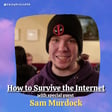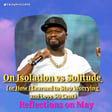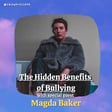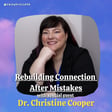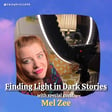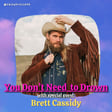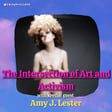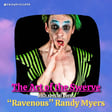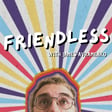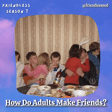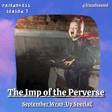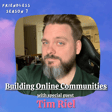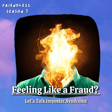Become a Creator today!Start creating today - Share your story with the world!
Start for free
00:00:00
00:00:01

Escape from Community (with Rod Peter Jr)
This week on a very special episode of Friendless, your pal James is joined once again by actor, writer, producer, and pro wrasslin' mark Rod Peter Jr!
They discuss navigating the world of Fringe theatre, the difference between community and society, making friends with mushrooms, and big sweat musclemen rolling around each other!
Follow Friendless on Instagram
Follow Hey, sorry I missed you on Instagram
Transcript
Introduction to guest Rod Peter Jr.
00:00:08
Speaker
Well hey there sweet peas, welcome back to friendless. I'm your host James Avermanco, back once again with a brand new episode with very special returning guest, actor, producer, wrestling aficionado, the one and only Rod Peter Jr.
00:00:25
Speaker
Rod and I discuss the anti-heroes of John Carpenter movies, how to put on a fringe play in your 30s, how to build a community with only a single mushroom for company, and so much more. Rod is an absolute joy and you're gonna love this episode, so lean back, get comfy, set your volume at a reasonable level, and enjoy my interview with Rod Peter Jr. here on Friendlist.
Exploration of identity and acting profession
00:00:48
Speaker
So Rod Peter Jr., you are returning once more to the show, and I cannot be more pleased to have you. I have so many disparate, well, I have so many different direction questions for you, and I don't really know where to start, but I think four listeners who either haven't listened to your other episode or just aren't familiar with who you are, I've been starting recent interviews with a very blunt question of who the hell are you?
00:01:17
Speaker
That's a deep question. That's a deep, deep, deep question. Or it's not. I guess it depends on how deep of a human being you are, right? What's the impulse? Yeah. Some people are like, well, I'm a cashier. Oh, that's how you identify in the world. Just a cashier. That's great.
00:01:38
Speaker
The douchey answer is I'm an actor, which kills my soul. I hate my spine. Every vertebrae just had just fused together, you know. Yeah. I think it's just I don't like it because if you're not already famous, you have to explain why you're an actor. You know, like no one goes like, hey, who are you? George Clooney, what do you do? Well, I'm an actor. Oh, so like.
00:02:04
Speaker
How does that work for you, George? Like, they're just, they know, they know right away. But if you're like, oh, I'm an actor, and they're like, hmm, like as a hobby, is there anything I've seen you in? What TV show? And you're like, oh, just like theater. Like, oh, like with a band? Like, nope, nope, that's not the same thing. Thanks for, okay. But who am I?
Managing pre-performance nerves and rituals
00:02:28
Speaker
That's a question I ask every day to myself.
00:02:34
Speaker
am i yeah funny thing uh i've been i i ask myself almost a version of that question in a weird way when i'm about to walk on stage for a show now and i have this like i have no jitters anymore with theater and uh
00:02:57
Speaker
I don't have that like, oh, the butterflies are like, will this work or will this not work? Like I, I get it all pre done. And then like, I write my thing and then I just go out there and I go, nope, you either like it or you don't. And I don't give a shit anymore. Um, but, uh, I have this like weird thing now where like the, I can feel the seconds, like the seconds before you have to walk on stage. And I always just think to myself like, what if I didn't? Yeah. What if I just walked away? Yeah. What would happen?
00:03:28
Speaker
What would happen?" And I just go, what life could I live if I just right now walked away and just did something else with my life? And it's just this weird. And I go, nope, don't have time to think about it. And then I just go right on stage. Because I ask that question. I'm like, what if everything was falling apart? And who am I? What is this? All these? And it's like, no, you don't have time to think. You've got to say lines. All right, great. Yeah. Yeah, it's a weird.
00:03:51
Speaker
It's a weird, stupid thing I do. I haven't been on stage in a long time, but the last couple shows that I was doing, I remember I wouldn't be nervous all day. Nothing would, you know, like I'd be, I do, I had like a bit of a pre-show ritual and I would always do the same thing and I'd like, I was playing music in the last show I was in and so I'd practice a song. And I had a similar experience to what you were talking about, about like, it would only be like the five seconds before
00:04:18
Speaker
you know, because the show would start with me on stage, so it'd be like, the house lights would go down, and then suddenly my heart would just go, brrr, you know? But then it's, you know, yeah, too late, go do your job now, you know? And it almost like, I don't know, I don't know if it's like, I don't think it was this intense, but it's like, I almost think of it as like a little bit of like an ego death moment, and it's like your body panicking because you're like releasing
00:04:46
Speaker
like the James identity, and you're about to inhabit the next character for a bit, you know? So it's almost like a little death, you know? And your body goes like, uh-oh, like, you know, I'm giving up this, you know, in these ego and stuff,
Mental health and criticism in acting
00:05:00
Speaker
right? And I'm not sure if that's safe or not, you know? Yeah, I don't, like, I have no idea if it's a healthy thing or an unhealthy thing or what it even means, but, and I was saying- Do you know any healthy actors?
00:05:15
Speaker
healthy actors like mentally healthy because I don't I don't know if I've met like a healthy actor and I don't say this accusatory or to anything but like but of all the arts I feel I sometimes feel like it's the least cathartic you know yeah it's it's the you're kind of damned if you do damn like there's two categories you're either you're so self-confident that you're a prick
00:05:40
Speaker
and no one likes you, right? That person's like, I'm perfect and I, you know, I'm so confident on stage or in front of the camera, right? And you're like, oh, I hate that person. Or that person is so self-deprecating. It's like, I'm a fraud, I'm a fraud, everybody hates me, I'm a fraud, I'm a fraud.
00:05:57
Speaker
Yeah. And then that person is also a little annoying because you talk to that person and they're like, no, no, I'm a fraud. I'm a fraud. I'm a fraud. You're like, just take the fucking compliment. It's just a black hole. Right. You know, nobody, you know, I was recently told and this one has really stuck with me. Nobody wants to fuck the little guy. You know, you've got to stop. You've got to stop playing the victim. You've got to stop playing the like low, the low status. Like nobody wants to fuck the little guy. Like be the big guy. You know, like you want to get laid. Be the big guy. Yeah. No, it's true. Yeah.
00:06:27
Speaker
Yeah, it's also hard to take compliments because if you're so self-deprecating and you're, you know, like when you go like, oh, if I'm the harshest critic in the room, no one can hurt me. No critic can say anything harmful that's already thought in my brain. You know, they could boo me and I'd be like, whatever. So when you go in just being really hard on yourself,
00:06:51
Speaker
Um, it's like you feel like you're putting up a thing of armor, but then, you know, the, the fallback of that is when people are trying to actually be genuinely nice to you and genuinely caring, you're like, Oh no, I don't know.
Theater production challenges and fringe festivals
00:07:04
Speaker
I just, it could be better. And you're like, Justin, come on, man. We're trying to be nice to you. Um, you know, and I suffer from that. Like I totally do like, yeah, you know, like I, you know, my, my thing now is just to go like, Oh, thank you. I appreciate it. Thank you. Like it was really nice. And you know, because.
00:07:20
Speaker
I'm always like the moment things done, I'm like, how can I make this better? How can I make this better? How can I make this better? What went wrong? How can you fix this? What's what joke can we, you know, change and
00:07:31
Speaker
you know, all the little things. It's all work and work and work and work and work. But it also like... That sounds exhausting. That sounds like no fun. I don't mean to say, and I say this with no judgment. I say this with like a deep empathy of like, but you're making a play. Like, where's the fun in it? You know? Well, and that's the thing is like,
00:07:51
Speaker
Like right now I'm in Edmonton doing Edmonton Fringe and just finished Winnipeg, had a week and a half off, go to Edmonton. And I was doing a solo show in Winnipeg and then a two person show in Edmonton and the two person show debuted. Like we'd never done it before. The other actor is from Toronto. So like we barely got to rehearse. We never worked together before. So it was just like, all right, we're diving in. Like we're doing this on the,
00:08:21
Speaker
Um, on the deep end. And so, you know, when you think of fringes and how hard you have to work and how much you're, you're the producer, you're the writer, you know, you're the costume designer, you're the lighting designer, you, you know, you gotta, if you don't do your work, you don't succeed with these type of shows because there's no crew, right? There's nobody who fixes the script for you. So you're like, okay, I gotta, I gotta make a script that's,
00:08:48
Speaker
Works for tech i have to do a tech script i have to do a lighting design i have to do a sound design i have to not just do the sound design after all put that in a q lab and i gotta send q lab technician. You know you have to do all your promo work you have to make your own poster you have to you know do all your publicity.
00:09:07
Speaker
You know, and then every day you're hitting the street and you're walking around town and you're trying to tell people about your show and walking up to strangers and saying, hi, you want to see another show? And, you know, and it's there's a level of it that's just absolutely draining and soul crushing. But then there's another level of it that.
00:09:24
Speaker
Once you do it, you're like, oh, I could do anything. I could do anything in the world now. You know, like some somebody's like, oh, I can't do this one job. Like, that's nothing. I did like 10 jobs, you know, to do something that may not make me money. And that's the craziest part is that fringe, there's no guarantee, right? Like, you know, you spend like five thousand dollars investing in yourself and you go.
00:09:45
Speaker
I hope I make this back, right? And you never know. You never know. Well, that's just it. And you're booking so far in advance, right? Because you book all the festivals sometimes a year ahead, and it costs a lot of money just to apply, let alone actually then get in. And all that's prepaid when you show up. So like you say, it's like the fringe doesn't give a shit. They've already got your money. Oh, yeah. They've got your money. They get it.
00:10:15
Speaker
You almost miss that sort of naive 20-year-old 18-year-old. You know, then you're fresh out of high school or university or whatever, and you're just like, I could do this and it doesn't matter. And you just got like, you know, all the charisma in the world, you know, and the older you get, you're just like, oh, man, if this takes, I'm ruined. You know, like, I'm constantly like every five minutes looking at my print sheet of the sales and going, OK, that's one more ticket.
00:10:40
Speaker
Okay, today I have to sell 26 tickets to break even, you know, and I just go, tomorrow it's 22 tickets. Or, you know, you're just like, you do the math and math. I remember being 20 and going, this is just fun, you know. Yeah. Let's go spend a week. I'm a star. Yeah. Right? Yeah. On a rarium. Yeah. You're like, woo. You're like, yeah. Yeah, I got a decent three star review. Like, that's a win for me. And you're just like, no, I'm going to go drinking every day. And you're just like, waste all your money on booze socializing.
New theater show and toxic masculinity themes
00:11:07
Speaker
Yeah. And now I'm like,
00:11:09
Speaker
you know, well, I don't drink anymore, but, you know, the whole thing, like, yeah, I'm good, you know, and just I'll be back at my billets in a bath, you know, just. Yeah. Yeah. So tell me about this. Tell me about these shows, because I've been seeing you posted about the Edmonton one and it looks like kind of a send up of Escape from New York. Yeah, yeah, yeah. And so tell me about the kind of like the genesis of it, what it is and how is it being received? How is this going?
00:11:37
Speaker
So far really good. We just got a really great glowing review in the Edmonton Journal. My favorite is that it says it's four and a half out of five stars. And the best poll quote is the very end. It says something along the lines of like, this is like a really great show, blah, blah, blah, blah, blah. If you don't mind hearing the word pussy a dozen times.
00:12:00
Speaker
And I was like, oh, okay, you're just gonna say it and not censor it in the newspaper. And I just like the idea of, you know, just saying, Edmonton Journal, pussy, four and a half out of five stars. That's the only poll quote I use on my poster now, pussy. Because yeah, our show is very vulgar and it's not for kids. And yet the best part is that Tamlin who plays Snake Plitskin
00:12:28
Speaker
or plays Kurt Russell as Nate Plitzkin.
00:12:32
Speaker
Kids see Tamlin on the street in this costume and just want to see the show. Oh, we got to come. And we're like, it's adult themes, adult themes. I mean, that's the case for the original Escape from New York. I remember seeing photos of him as a kid and being like, that's the coolest man I've ever seen on Earth. I must watch this movie. And I remember seeing it and being like, oh, I should not.
00:12:58
Speaker
have watched this. Well, yeah, it is old to be like, I should be doing this. Right. And I think that was the like, that's the kind of idea behind it. The whole sort of genesis was I last year after Edmonton Fringe. I I was hanging out with Tamlin Bryson, very, very talented actor, and she's been doing fringes for a little while.
00:13:28
Speaker
And she was just telling these really crass stories around the beer tent. And they were just really funny. They were very, very crass. And her shows are very not crass. They straddle the line a little bit, but they're more parental guidance and there's adult subject, but it's not dirty humor. It's not R-rated kind of comedy.
00:13:57
Speaker
Um, but she was just telling these like really raunchy stories and they were incredibly funny. And we're just laughing to the point, like people like crying going like, Oh, this is so funny. And I was sitting in the airport in Vancouver on the way back from Edmonton with my best friend who was my stage manager and we're having breakfast in the airport. And I just said, Hey man, I have an idea. What if Tamlin played Kurt Russell as Snake Plitskin and fucks a puppet on stage?
00:14:27
Speaker
And he was like, yeah. That's my idea. That's it. I was like, I just wanna create a show based off of this dumb idea where like there's a female puppet and Tamlin, this femme presenting, like a female, playing a male and does something super toxic, like all about toxic masculinity and what that is and box a puppet on stage.
00:14:55
Speaker
Just like, does a sex scene. And I was like, I just think that'd be the funniest thing on the planet. And he was like, you should tell Tamlin. And then I kind of like wrote a little bit of a plot synopsis in a couple of weeks. And then I sent a message to Tamlin. I was like, hey, I have an idea. And she went, I'll do it. I went, great. And then I thought of it as a solo show just to write for her. And then she said, would you do it with me? And I said, well, think about it. And then agreed. And then we started writing it. We took a year to write.
00:15:22
Speaker
this whole thing and I just we spent like four months just going like watch everything like watch every 70s 80s action movie I just watched like every I like I watched everything but I think three Kurt Russell movies like his entire film just taking all the references and like what can you well you can get I mean most of it's John Carpenter stuff in the show but
00:15:45
Speaker
Yeah, it's kind of almost it feels almost like it's going to be a love letter to John Carpenter. But it's more of this like, hey, we really know what we're doing here, which is holding a mirror up to
00:16:00
Speaker
those type of characters in those type of films, and showing you how crazy it was. And saying like, hey, you actually thought this was a hero. But this guy's Rick, and he's a misogynistic jerk, you know, and he takes advantage of women, and is racist and not okay, you know, and yet is like, I'm the hero.
00:16:20
Speaker
And so we didn't hold back. Like we just like wrote these jokes within this whole thing where this person's just like, you know, like, let me guess, this guy's name is Pablo. He's got a bomb strapped. You know, like, no, no, no, no, no, no. You know, just you can't say those things. It's like, well, I don't know. I'm pretty sure men are allowed, you know, just really creating a character that just goes like, yeah, I have no censor to myself. Yeah. But then
00:16:47
Speaker
putting it in a situation where it's a femme-presenting person playing a masculine person. And what does that look like? Like almost clown-esque. And then myself playing all the side characters. Like I play Steve Buscemi guy, like the sidekick. And then we have a puppet that's all the female characters because we were like,
00:17:10
Speaker
Well, you know, I was like, it just feels weird for me to be like, yeah, like I'm a guy and then play it
Meta-commentary and comedic elements in shows
00:17:15
Speaker
Fay, you know, or like put like a female voice to it. That stereotypical, like I'm a lady, like that kind of garbage. So just like removing that and just going, oh, it's just my voice, but a female puppet, you know.
00:17:28
Speaker
And yeah, and then just like putting all the weird shit in. All the people characters are just like your deep, regular voice kind of thing? Yeah, yeah. Like I don't even try. Like I don't, I'm not like, I'm like, oh, I'm, you know, the main villain is called Karen Jane Roding, which is a cis white straight woman. And Snake is like, well, I don't know. White people aren't known for doing bad things. But if it was to start some way, it'd be a chick, am I right? He tries to like high five.
00:17:57
Speaker
And, you know, I'm always like, I'm like, no, no, no, you can't, you can't say that. But Tamlin is so invested in the character of playing Kurt Russell as Snake, and just like, no, like, yeah, like, it's so cool. And then it's just bonkers, like we use shadow puppetry, and there's like,
00:18:17
Speaker
you know, we do a fake mime motorcycle chase scene and we do a full five minute fight, which we completely do shot for shot aside from one backdrop and a weapon that's used from they live. So the big famous fight where the two of them fight, where he's like, hey, put on these glasses, like don't touch me. We watch that and do it beat by beat.
00:18:43
Speaker
for like the exact same thing. And then we do that. But then we also then play a commentary track of ourselves talking about how we watch the movies and how we choreographed it beat
Action films and cultural commentary
00:18:55
Speaker
by beat. And so it's like this weird, meta, bizarre show. Have you this is just right. I literally just finished reading this book the other day. It was called it was just called Predator, a memoir, an obsession or something like that by this guy Anders.
00:19:12
Speaker
and or something and he talks about like he's watched like he's like in his like late 40s early 50s and he's watching Predator like 150 times like just for the book kind of thing and he like deconstructs it like almost frame by frame to the point of just like obsession and you know he impacts all the like you know like the novelization was written by this like famous gay poet who at the exact same time he's writing
00:19:39
Speaker
Yeah, there's just so many side stories. At the same time that this poet, his name was Manet or Monet Manet, I think, at the same time he was writing the novelization, his partner was dying of AIDS. And he actually ended up writing a memoir of that time where he's talking about watching his love die from this virus. And he was working on the Predator novelization.
00:20:06
Speaker
and then like there's all this other stuff obviously there's like deep homo eroticism involved and there's like you know and there's all that but then the other thing that you're talking about that is so like explored in this is this like watching someone watching something watch something watch something you know and like the removal of like
00:20:24
Speaker
You're watching the Predator watch Arnold, but you're also watching yourself having watched it, and then you're watching yourself watching it. It's just like it becomes this really deep layered deconstruction, and it's fucking fascinating. And it's actually sent me on a bit of a black hole recently of rewatching all these old 80s, 90s action movies, Terminator, Robocop, Predator, all these. I love Robocop.
00:20:50
Speaker
It's fucking a robocop. It's yeah, I have that on a 4K and it is amazing. Like the arrow 4K of robocop with all the special features. Oh, my God. It is amazing. It's you. Have you seen the video, the YouTube video of like the guys that make fun of that, the the groin shot?
00:21:12
Speaker
You know, like in the movie where he's like, you know, they're going to like, you know, and then he shoots the guy in the groin. There's a there's a YouTube out there where he shoots it and it just gets more graphic. And he basically groin shots like a hundred men.
00:21:30
Speaker
And they just, like, these guys made this, and it's an amazing video. Like, they somehow work themselves into the shot, and it just gets graphic. Like, there's a non-graphic version, and then there's one where you're like, you see all the genitals and all the exploding, and you just see, like, man, man after man after man after man be like, let's get this lady! And they just, like, one after another just get their balls exploding. And it's so funny. Like, you just don't see it coming, and it's just, oh, my God.
00:21:58
Speaker
Yeah, because it is a perfect idea because when you see that scene, you're like, Oh, that'd be funny. And then someone did it. Yeah. But Robocop Robocop on its own, like, yeah, it's also like, it's another level good because it actually understands the genre. Yes. Right. And so I think some people kind of like showgirls and the Starship Troopers or recall, like,
00:22:20
Speaker
all of that filmography from the director is like, it's all, what he does so well is he holds up a mirror to like American society and goes like, this is how fucked up I view the, like what I'm doing from you, this is what I'm seeing. And then people every single time at the time are like, what a weird film that I don't understand. He's just weird. You don't get it. Like he's holding up a mirror to society here. And that's what like Robocop is fascinating. It's like fascinating about like,
00:22:51
Speaker
people's fascination of like police culture and like the violence and like reality police TV, you know, and just like all of that, like interesting, weird. And then like the sub, there's a, I think there's a subplot within Robocop that's about like global warming.
00:23:12
Speaker
that's in the later ones yeah the way it's like I think it's like in the background in the news right like yeah it gets put a little bit but it's like that's the the well like yes and no if I remember I only watched the first one recently but I remember it being more in the second one
00:23:31
Speaker
But I know the second one isn't very good. So I just know in the background of the first one, there's just these funny little news bulletins of just like how awful everything. And it just progressively gets worse and worse and worse. But it's the same like happy go lucky. I buy that for a dollar. Oh, yeah, yeah, yeah. And that's the thing is like the commentary of like reality TV and just, yeah.
00:23:57
Speaker
Yeah, his like weird under the current bee plots like you just go god he's so
00:24:03
Speaker
Good. Yeah. Um, but it is, it, you know, it's so fascinating watching them too, because it's like, they, you know, like you talked about about snake Pliskin is that it's like, these characters were like the idolized men for generations, you know, and it was like the tough, no nonsense, punch your problems away and get the girl anyway. And, and no matter what you do, she's going to love you and, you know, and, um, and like, and just like the casual homophobia.
00:24:33
Speaker
Oh, yeah, yeah, yeah, yeah. And it was romanticized, right? It was glorified. Yeah. And that's always my question with John Carpenter films is I'm never quite sure if he has his finger on the pulse and is making the commentary.
00:24:52
Speaker
Like there's such a fine line with his stuff where you're like, huh, like, you know, like you're like, I don't know. Like there's times where I'm like, like, are you making the commentary on these types of films or are you not making the commentary?
00:25:08
Speaker
I think he's too, from what I know about him and like, this is me just. Cause I don't know anything about him. Right. Like I didn't, I never was like, let me deep dive on the director. I was like, Oh, I'm going to watch his films and we're going to make fun of the films. But I don't need to know the guy. Yeah. I got into a few because I got really into Halloween for a bit. And so I started learning a little bit about him through that. And like the first Halloween was like an impulse, right? Like he wrote it in a weekend. That's why it's like, it's like very.
00:25:36
Speaker
if you actually unpack it, it's like actually a piece of shit. But I love it. So, you know, but it makes no sense whatsoever when you actually start pulling at the threads. But yes, I think on Halloween, no one's home. Right. Yeah. Well, it's like the whole whole. What's his name? Oh, fuck. What is his name? The psychiatrist. Oh, yeah. Like Loomis serves no purpose anyway. But it's like he he.
00:25:59
Speaker
He's a very impulsive writer. He's also more of a composer than he is a director. Like he writes more for his music. And I don't know. I get the sense that he he writes on impulse and then he lets other people say what what
Ambiguity in John Carpenter's films
00:26:16
Speaker
they think it is. And then he goes, yeah, yeah, that's what I meant. You know, and I I don't know. I get the impression he's a much bigger misogynist than than I think is normally ascribed to him.
00:26:25
Speaker
You know, it's like no female thing where there's no women. Yeah, you know. Yeah, exactly. You're like, oh, like, yeah, you don't. Yeah, it's funny because like I really enjoy Christine, but it's like a Stephen King book. And so like he can't really put it like because he didn't write it. He didn't put in like his own. So like it's a pretty interesting story, Christine. And again, like the thing is just all it's the whole male.
00:26:54
Speaker
But there's things like they live, which I love they live. But then there's a side of it, you go, I don't know what you were trying to say here. Because we now live in a world where you're like, okay, obey, but obey what? What is the anti? Is the anti-government? Is the anti? And what does that mean? And now you're like, is he? Because now you go, all right,
00:27:19
Speaker
No, I know some weird like Trump supporters going to also be like, that means this. And you go, no, no, no, it actually is the opposite of that. But because he's never really come out and just been like, this is what it's about. Yeah. It's almost like anybody can identify with it. And thus the film almost becomes problematic. Yeah. Well, it becomes generic, you know? Yeah.
00:27:39
Speaker
And the film itself is like just messed up and like entertaining just for the Roddy Piper stuff. Like, yeah, you know, who himself was or how come? Oh, yeah. But I mean, like, or like hell comes to Frogtown. Like, that's a movie, right? Just if you ever want to see like the greatest Roddy Piper movie of all time where
00:27:58
Speaker
He's the last man, the last versatile man on the planet. And so all the women are like, we have to have sex with Roddy Roddy Piper. Frog mutants. And yeah, it's insane.
00:28:14
Speaker
Yeah, yeah, I don't know. I guess I don't. I haven't spent since like, you know, since my like deep dive on on those initial movies, I the more I think about it, the more I realize I haven't put a lot of thought into John Carpenter. But like I.
Parody of conspiracy culture and satire in shows
00:28:29
Speaker
Oh, shit, I had a thought about what you were saying about that. Oh, but like they live is that it's like.
00:28:35
Speaker
those are the kinds of movies where it feels like the modern like the modern equivalent is like um it's joe roganitis of like yeah just being oppositional but actually like not actually standing for anything with any genuine substance it's like you just are oppositional because it challenges your status quo of like you're normal and you're the best and so yeah you know
00:28:59
Speaker
and then and then but then as soon as you start unpacking those you realize that they stand for nothing and they're just actually just like vapid conservatives again you know like it's just the same horseshit repackaged you know and and I'm just really tired of like yeah but it's like
00:29:16
Speaker
Oh, but it's cool, man, because like he puts on these sunglasses and then he like sees the real world, man. And it's like, oh, there you you see the real world. Like, there's no fucking conspiracy. There's no lizard people like the fucking people who are laughing at you right now. You can see them right now. You know, yeah, it's just it's infuriating.
00:29:36
Speaker
No, yeah, I tell you, it's interesting you say the Joe Rogan thing because in the show, the whole why Snake has to go to, because it's called like Escape from Edmonton, and then in every city we change the name of, you know, what the title is, like, you know, Escape from Saskatoon or Escape from, you know, Minnesota, wherever you want to go. But in this case, what doesn't change is why Snake has to go. So there's a black box with a very important item inside of it, and he has to retrieve it because it's been lost within the prison.
00:30:05
Speaker
But what you find out is that what's inside the black box is a cassette tape. That cassette tape, when played, can brainwash anyone who listens to it. And so the main villain wants the cassette tape to play it, and then to be able to brainwash everyone in Canada, and then use keywords with their voice. And the joke is like, and I'll say things like sheeple, woke, and Second Amendment, and then I'll be the new leader of Canada.
00:30:29
Speaker
But then it's like, well, what is actually played on that cassette tape? What is the actual thing that does audio? And it's like, whoa, well, it's just a simple guy named Joe who smokes pot and talks to an array of guests. And then over time, without you even knowing, just over time, very slowly, he starts talking to conspiracy nuts. And then without you even picking up on it, bammo, they start telling you to do stupid shit like shoving a horse pill up your butthole.
00:30:53
Speaker
You know, and then it just delves into this thing where it's like, but once you're hooked, you're hooked and you'll believe anything this moron tells you. Right. It's like, and that's why we want this because it's like the most palpable sort of garbage thing that people go. Okay. And then they're like, and then if you just slip in right after that and go.
00:31:09
Speaker
Uh, also this they're like, did you hear? Uh, you know like cows now, uh, you know shooting from the right balls. Yeah. And you're like, no, what are you talking about? Like, and just, you know, it's a thing in the show where nobody really laughs at that joke is like, Oh, okay. But we're like, no, we're not changing that because that's like a very true.
00:31:29
Speaker
thing, right? It's like right now there's a lot of this garbage of like, well, I listened to this and, you know, yeah, cool. And I trust him. So I don't have to do my research because yeah, yeah, yeah, exactly. Yeah. And that's kind of like also a big part of the show is like this idea of like,
00:31:47
Speaker
you know, just this like, it's just white male being like, well, I think, and so therefore it is. And anyway, moving on, not gonna question, not gonna even research, you know, just not gonna do any work. And you're like, what is happening here? And then the audience sees that, and that we are like, but that's the protagonist. And we just openly show that the protagonist is constantly doing this, but nothing ever goes wrong for the protagonist.
00:32:13
Speaker
Right? Like nothing bad ever happens in our show to Snake. Snake lives, Snake wins, Snake gets the girl. Like in the end wins everything and is still like, and I didn't learn any lesson. Yes. Right. And then everyone's like, what the hell did I just watch? And you're like, yeah, exactly. Think about it. You just watch every story you've ever been told. Yeah.
Community and personal acceptance
00:32:41
Speaker
I want to look back to, relating to the experience of continuing to work within theater and the process of Fringe, and I think that this really plays into one of the core questions that I've introduced to this new batch of interviews has been this question of community. It's a term I've been hearing batted around a lot.
00:33:05
Speaker
for any number of different communities, right? And the evocation that the word presents. And as I started to define it for myself, I realized that it's so nebulous that it's almost undefinable in a lot of ways. And so I guess I'm really curious, like, what does it mean to you to have a community? And what does it mean to sort of show up within a community?
00:33:32
Speaker
Yeah, it's an interesting because like, I know you had sent before the podcast to be like, Hey, here's that sort of question. And I, I agree with you, like, everything you just said, like, those were the thoughts I had, right? Like, Oh, it's such a big thing. What does it really mean? Yeah, it's a really, it's, it's tough, right? Because I think a lot of people put stock into
00:34:02
Speaker
community. And I think that like, you know, the obvious answer is like, that it's important that it's needed. You know, without community, you're nothing. You know, you're not like the idea of like, you're not alone. Right? Like, it's suddenly kind of like, I was thinking about I was like, Oh, like thinking about being sober now. And, you know, like that idea of,
00:34:28
Speaker
when people were like, oh, you know, if you're, or like depression and like, you know, being someone who's like, oh yeah, like I now know that that's what I've been diagnosed with for like years and years and years. And I can talk about this, but then thinking about how when you're struggling and you don't have the words to communicate, what is presented to you is be like, well, reach out to the community communities there, find the community, find the community. Um, and it made me really think about, um,
00:34:57
Speaker
how we teach people to find community and find that support.
00:35:03
Speaker
but we don't really teach community to embrace. I think that there's an interesting thing about how we're always like, you do the work as the individual, not the group help the individual. It's almost like it should be all for one, not one for all in that sort of situation when it comes to community because
00:35:28
Speaker
if you have a community and then you have a single, like somebody who's singular, who doesn't feel like they're in the community, it really shouldn't be their job to be like, how do I fit into a community? Where is my community? Like, you know, it should be community that just embraces. So if somebody walks into a room and is like, hey, I think I identify within this community, they go, great, come on in, you know, not like, well, do you let's get out our checklist and like, do you check, you know, and it's like, wait a second.
00:35:58
Speaker
Yeah, so it's tough, right? And the other thing I was thinking about, and I know there's a little bit of an offshoot, but I read this book recently, double check, I don't wanna get the title title wrong, but it was called The Stranger in the Woods, The Extraordinary Story of the Last True Hermit.
00:36:26
Speaker
And it's a true story. I think you would actually love this book. Get it? It's about this like true story in the 2000s. They found this guy. He was arrested for being a hermit in the woods of Maine. And he had basically been a hermit for like 30 years, like over 30 years. And the whole thing is that like at one point when he was like out of high school, he just went, I don't want to do this anymore. Got in his car and drove into the woods. Didn't tell his family and just disappeared.
00:36:55
Speaker
And he just lived outside. He didn't have a tent, nothing. And the way he survived was just like stealing from the cabins, like around this lake and from this forest. And finally, he gets arrested because of technology. Eventually, they're like, hey, we have better security systems and all this stuff. It's in the 2000s by the time he gets arrested.
00:37:20
Speaker
And so this person hears the story and goes and meets him and writes a book through their interviews. And it's really, really bizarre. And at first you're like, Oh, that's crazy. And it delves into like, you know, like nine out of 10 people, you know, can't even go, you know, four hours without having human contact.
00:37:40
Speaker
Right. And all these like stories about monks and people in caves. And but this person just for like 30, like over 30 years was like, I don't even have to speak to a human being. And I'm happy. You know, and like the most fascinating part is that like the closest thing that he had to like.
00:37:57
Speaker
a pet or someone to talk to was a mushroom that just slowly grew over those years. Right. And this guy never talked to people was like, no, I never talked out loud. I never talked to myself. I was just happy. And he wasn't vengeful. He wasn't angry. He wasn't like, Oh, I have to like, he just was like, no, this is just what I want. And I don't want to be a part of this.
00:38:22
Speaker
And by the end of the book, there's this really like fascinating sort of viewpoint of like, he was just happy with his body and who he was. In a very like bizarre way that you don't think about. He was just like, no, I'm okay with me. And I'm okay just being out there. And I just, I'm okay with silence. I'm okay with aloneness. And it's the opposite of what community tells us we need to have, right? It's like, no, you have to have community. And it just really made me think of like,
00:38:51
Speaker
this idea of you can't really be productive and helpful within any community. You can't help anyone if you haven't helped yourself. If you're not happy with who you are and your body and who you are in the world, how can you be with other people? Totally. And even though, like, you know, on a weird level, he was like, I just don't want to be around people.
00:39:18
Speaker
There's like, there's an interesting kind of lesson to be learned of like, oh, he was happy. Yeah, with that, you know, and it's like, how can I, you know, like, how can I as a person, not rely on community? You know what I mean? Like, where I go like, Oh, I got FOMO, like fear of missing out, because I'm not part of the community. I'm not, you know, like, theater community, if I'm not out and about, if I'm not socializing, if I'm not,
00:39:44
Speaker
in this or I'm not in that, then who am I as a person? And it's like, you're still you. You're always you, right? Like, you don't change. And it's like learning how to be happy with yourself and your own time and your own body and
00:40:01
Speaker
and that sort of self-acceptance because I, you know, the thing that I'm exploring right now is like being okay with saying no to things and being okay just being like, I'm cool. I'm okay just doing what I need to do with myself. And I'm part of this community, but I'm also, I don't need to be like, I'm in this community. Like I don't need to like in certain things. And, you know, when we talk about, you know, and now I think, you know, the thing you were sort of touching on like,
00:40:30
Speaker
what does community mean? It's like, you know, we now have like community is like, you know, like the LGBTQ plus a community you have like, you know, like there are communities within communities within communities within communities. It's like, um, and it's, and I think that's great because of what it's doing is it's allowing people to like find themselves, right? We're like, Oh, I see this, you know, and it's there. Um, and, uh,
00:41:00
Speaker
Yeah, and it's like, but how do you how do you still find yourself?
00:41:04
Speaker
within those, be just happy with yourself, even if you're like, I'm not sure if I fully fit into this category. You know, because I think that's the thing is we create categories within categories within categories. Well, so yeah, I think this is where my brain leads is that it's like I almost I think I think internally I think what I differentiate from what I'm hearing you talk about is is a separation of like community versus a society because I feel like a community a community is like
00:41:34
Speaker
for lack of a better word, is a safe circle, you know what I mean? And while I'm somebody who will question what my status is within my community and where I stand and am I loved, and I will have those questions, it's also like,
00:41:49
Speaker
Those aren't questions that anyone can answer but me, you know, because I think a community would recognize that those are internal problems I have and would accept me anyway. But I think what I'm hearing about those external pressures, that's like a societal pressure, which to me is like, it's either a larger circle or it's a more ambiguous, maybe it's more of a straw man situation, but it's like, you know, those pressures of like,
00:42:13
Speaker
forcing yourself to fit in or being forced to fit in or any of those things or figuring yourself out. That's more to me like a cultural or a societal pressure than an actual community pressure. Because I totally understand what you're saying about them and I think
00:42:30
Speaker
I think that, at least what I lean towards though, is that community would be a safer circle to be able to come in and out of, right? Whereas society isn't something safe to come in and out of. Yeah. Yeah. And I think that's the goal is that that's what it should be. And then I get worried about that they bleed into each other.
00:42:49
Speaker
Right. That like you're like, oh, this is a community. And then they take like societal norms into the community thing. And you're like, oh, what is happening? And you're like, this is supposed to be a safe space. And now you're actually excluding someone and being harmful to someone.
00:43:03
Speaker
even though that's what you said you're against. You're trying to be like, we're accepting on this and we should do this. And then somebody walks in and you're like, oh, but you're not enough of that yet. Well, that becomes an internal negotiation for yourself though, right? Exactly. There's nothing I can do or say that would change that other person's behavior. It's like, I can't change how somebody thinks.
00:43:31
Speaker
If there is somebody in my circle who I have felt safe with and I no longer feel safe with, that's now on me to negotiate. Do I continue that relationship or not?
00:43:43
Speaker
Um, and like, there's, you know, and that's like, that's not easy. That's like, there's a lot of sadness to that, right? But it's like, you know, it's, it's things shift, things change, right? Nothing static. And so it's like, because I, I, I hear, I hear what you're saying too about like, you know, um, and I think, I think all sides of the like supposed sort of like political spectrum do this of like, there's a, there's like purity test, you know, and I, and I know that there's definitely that on, on left leading.
00:44:11
Speaker
groups as well. No matter how well-intentioned, they still are leery, right? And that ends up getting manifested in
00:44:21
Speaker
inadvertently destructive behavior, you know, whether it's like gatekeeping or, or, you know, purity testing or whatever it might be. But, um, but it's like, I think, I think for me where that comes down to is like, yeah, like I say, just like negotiating with yourself of like, okay, this was safe, but like eliminating the like sunk cost fallacy of like, well, wait, but there has been time spent, you know, um, and just removing that altogether and instead being like, well, it's not safe now. So I'm going to remove myself, remove myself until,
00:44:51
Speaker
Or if something changes, you know, yeah. And I know I fully agree. I also think that that can also be hard to write like like in practice, you know, like like it's one thing, which is why like it's almost a weird thing. It's so much like you need community within community to like totally to know. Right. You go like, oh, this this thing's feeling toxic and I want to remove myself. But sometimes we're like, no, but that's part of my identity. So I shouldn't have to leave.
00:45:18
Speaker
You know, what do I do? You know, and then it becomes like a whole mess. Well, and that's I think I think that's the thing that like that like spikes me about about like a story like say of like a hermit or something is that it's like, I think that that's like, I'm fascinated. I can't wait to read this. But it's also like, I do believe that humans are a communal animal. And so I do think like, I mean, without knowing anything about this guy and not trying to impose any assumptions on it, but like,
00:45:44
Speaker
But that feels like there's a sadness there. And that feels like there's a disconnect there. And it's not something I'd be interested in doing myself. I'd love to learn about him, and I'd love to hear about him. But I do think even a community of two is still a community. And he technically had a community. He had a living thing with him. Yeah, he's in nature, and that's just like he's connected to that. And that's what you kind of find out sort of in the end is that he's like, no, no, I just don't want people.
00:46:13
Speaker
you know and once he like you know he gets arrested and he goes to jail once he gets out he has to live with his parents again and they keep coming back to him you just see this guy who's just miserable miserable to be in society right just like i hate this i just want to be in nature i just that's what makes me happy is just being alone and doing this and they're like why like just the fact that nobody can understand it
00:46:38
Speaker
And he's like, because I don't want to talk to you. Right? The amount of disdain that he had for conversations. And yours is like, oh, you're just a rare bird. You know what it's like? You're the rarest of birds just out there. He's just like, no, I'm over here. And you're like, that's fascinating. Folks who listen to the podcast are going to know on some level that you are a wrestling fan.
00:47:06
Speaker
Yes. I make no bones about it. Make no bones about it. So here's my question. In a world of professional wrestling, characters often embody larger than life personas.
Wrestling storylines and friendship
00:47:22
Speaker
So how do you think the themes of friendship, self acceptance and community play out within the realm of wrestling storylines and the relationships between wrestlers?
00:47:33
Speaker
Oh, well, there's I mean, that's to me that's embodied in the like almost 10 year long story of the elite and and all the ins and outs that have been going on with that. I think Kenny Omega and Adam Page
00:47:48
Speaker
our master storytellers of intimacy and unpacking toxic masculinity through their wrestling, and maybe even Adam Page more so. But I think I lean on Kenny Omega because of his long story with the Golden Lovers, with Koda Ibushi, and how he's doing a queer storyline about a tumultuous love affair. And so watching how the elite
00:48:19
Speaker
are close and intimate and tight and touch each other and then they break up and they fight and they you know and like I think it really represents the the chaos of what it means to be a friend and I think I think actually a lot of stories you know a lot of stories of like you know tag teams who like
00:48:39
Speaker
achieve things together and then break up and then reunite. I think there's a really stock version of what it means to be a friend within that. I also was unpacking the other day about how there's a lot of born again Christians in wrestling and I get the feeling that it's because
00:48:58
Speaker
they get to touch boys all day, you know, like, but it's like, but it's a straight way. Like, like, no, I'm not good. No, I just grease up and wear a bikini and touch boys for a living, but it's not good, you know? And so I just, I can't help but feel like it's them circumnavigating, like it's like a little, a little cheat route, you know, it's like a shortcut through Mario Kart of like how to, how to touch boys and not get in trouble with God. Yeah.
00:49:26
Speaker
I was going to say that, yeah, when I was like Christians, I was like, oh, it's probably because so many of them were like, we just had sex with everybody, cheated on all our wives and did all the coke and drugs in the world. And then they get old and they're like, oh, I'm going to have a heart attack and die if I don't stop. And then they meet someone at their fifth wife who's like, Jesus is the way. And they go, sure. All right.
00:49:49
Speaker
Jesus and yoga, you know, and they might as well try it and they're like, Oh, I'm good. Yeah. And so it's like, so they just like buy in because it gets them away. Cause like, it's either that or admitting that you had a problem. You don't go into like AA and all this other stuff. Like just the amount of like.
00:50:04
Speaker
Yeah.
00:50:21
Speaker
But it is. Yeah, no, I think I think actually there's lots of storylines that that deal with, you know, obviously in a very like melodramatic and heightened and circus version of it. And also like there's yet to be a storyline that I see that resolves with not fighting, which like I would, you know, as much as I love wrestling and I love the art of it, like I'm not somebody who thinks you punch problems, you know. So so it would be great if they somehow
00:50:48
Speaker
through a wrench in there somewhere and found a way to tell a story where they actually talked about it and confronted each of their mistakes and took accountability for their actions. That'd be insane, could you imagine? At Wembley Stadium, they're just like, we've both made mistakes. It's the main event and we're just going to hug it out and not wrestle.
00:51:20
Speaker
You know, the real heart, as I often caveat here, the real heart of this show has been this question. It really focused on, have I been a good friend? You know, that was sort of the heart question. And as I was unpacking that, I got to realize what again, you know, a term like community, a term like friend. These are really nebulous, really multifaceted terms. And every time I pose this question, I get this really beautiful
00:51:33
Speaker
Okay, we're friends now. End of show. Yes! Oh my god, I would love it. I would love it. I'm dying for that. That made of it, you know?
00:51:46
Speaker
different answer because it's such a singular experience, you know? And so I put to you what I've put to all the guests. To you, what does it mean to be a friend? Yeah. Yeah, again, it's such a big question. And yet it's probably also a very simple question. I think if like at its core, no matter what someone says, as I was thinking about this, it's almost like
00:52:17
Speaker
I think like, you know, you, no matter what their answer is, it's always going to get boiled down. You know, you can whittle it down to what it's core, like what one thing means and all of them shoot out from one answer. I think that at the end of the day, it's based on embracing others. Like I think it's just that that's what it is at its core. Is that if you're just someone who's willing, like, you know, when you're a friend to someone, you've just embraced them.
00:52:45
Speaker
that you just go like, I embrace you, you know? I get wary of the word like acceptance, because acceptance kind of feels like a, like I had to, like, you know, it's like, yeah, like, yeah, it's like, well, I accept it. And it's like, no, no, it's like you just openly embrace someone.
00:53:01
Speaker
And that idea. I love that reframe. I love that so much. Yeah. Like I think that's just what it is at its core. So when you're like, when somebody gives an answer and they're like, Oh, it means this and this and this, you're like, no, it all kind of trickles down to like, embracing others and getting embraced yourself. Um, yeah, which is a, yeah, it was a thing that I think people
00:53:25
Speaker
should be doing more of. I think I kind of like I think that connects a little bit to like my the previous thing we're talking about, which is like, you know, the community in like, you know, accepting or like embracing rather than an individual searching. Right. Like one of my key things is like you should never have to look for support support should should just be there. And it's easy to do so. Yeah.
00:53:52
Speaker
Yeah, because there's so many times when you're like, oh, I'm looking for this thing. And sometimes you'll be looking for that support and that friend and that friendship, and you'll miss that somebody was holding their hand out the entire time. You'll be shocked. You'll be shocked on how many times or who it's going to be.
00:54:15
Speaker
will extend their hand and help you up when you're feeling down. It may not be your best friend. It may not be a family member. It could be a stranger. It could be yourself. You could have a moment with yourself and you're like, oh, I just realized this thing. But again, that comes back to embracing. If you embrace yourself or somebody else is like, no, no, I embrace who you are.
Identity changes and societal parallels
00:54:40
Speaker
And you're like, oh, OK, great.
00:54:43
Speaker
I can be mean, you know. Yeah. I think that's kind of at its core. I love that. I love that. I mean, you know, I was thinking a lot about recently, I was thinking about the concept of grace, you know, and like, the concept of sort of like,
00:54:58
Speaker
you know, allowing, which I know has closer connotations to something like accepting, but it's just this, what in my heart, what it feels like I'm driving at is this, it's not allowing as if like, I deign to allow you to exist, but it's more like, oh, that's who you are, absolutely continue that, you know? And I think that more comes back to this idea of grace, which is like, you know, I think people who, you know, to use like a very simple,
00:55:27
Speaker
but like prescient problem right now, like people's resistance to like pronouns, you know, is that it's like I find that very ungracious, right? Because it's like two hours on that one. I know. I know. And that's why I was like, we've got to keep it simple. But it's like, it's like all that someone is asking you for is like, this is a word that you already know. And I'd like to be addressed with that word. Yeah, that's it. That's all it is. And it's like it's a lot. It's very to me, it's a very deep lack of grace to to resist that, you know, like it's like,
00:55:57
Speaker
It's very clumsy and it's very sloppy and it demonstrates the person who's resisted like, you know, has something really sad within them or has something really broken within them, you know? And I do feel a lot of empathy for people who resist it because of the confusion and the fear that comes along with it. But at the same time, too, you know, it's not hard to just go, oh, OK, you know, like it's the easiest thing in the world.
00:56:27
Speaker
to just be like, okay, you're you. Great. Exactly. Exactly. I constantly say it all the time. I'm like, the only thing I care about is if you're an asshole or not. That's it. Yes, that's exactly right. You know what I mean? You could be non-binary and an asshole. You know what I mean? You could be a cis straight person and an asshole. I only care if you're a nice person or not.
00:56:50
Speaker
that's it like if you're a nice person to me then and the people that I love and like I care for great and if you're not then I'm just not gonna give you the time of day I don't care who you are in the world I'm just not gonna put myself in situations or the people that I'm involved with
00:57:06
Speaker
to go like, hey, I'm gonna just let this crap happen. I'm just like, no, I'm removing it. Like, bye bye. Like, it's okay. And it's like, and yeah, like the pronoun and just like the whole like, why don't it's like,
00:57:20
Speaker
There's just do it. Like you don't care. You know what I mean? Like you called someone Prince until the day they died. And at one point they were just like, I'm now the artist formerly known as Prince. And you went cool beans. You know what I mean? Like Madonna's name isn't Madonna. Why do you give a shit? Puff Daddy changed his name a million times.
00:57:41
Speaker
Right? Like, his name's not Snoop Dogg, and yet here you are, calling him Snoop Dogg. Right? Like, why do you do this shit? I actually always use wrestlers as a really good example of that, like straight people. His name's not the Undertaker.
00:57:56
Speaker
Well, not only that, like I actually think that, um, wrestling culture should be used as a bit of a case study for dead naming because like, you know, like, like, you know, he used to be Dean Ambrose and then he shows up at a new, at a new, uh, promotion and now he's John, John Moxley and everybody adapts to it. And so what I don't understand is like, well, why, why does he get that grace? But, but someone else doesn't, you know? And, and, and they don't, they don't understand that it is the same thing. Like it's just, Oh, it is exactly the same thing.
00:58:26
Speaker
Who you are in that moment, right? So yeah, but yeah, that's that's a great. That's a great thing. I think I'm going to use that and be like, oh, that's cool. So do you just get are you like every time someone's like Hulk Hogan, you're like, uh, Terry. Exactly. Terry. Exactly. No, he's Hulk Hogan. Like, what do you give a shit? You know what I mean? Exactly. That's just what it was. You don't even know that the guy's name is Terry.
00:58:52
Speaker
If I was like, hey, Terry, you'd be like, excuse me, his name's Hulk Hogan, right? His name is Hulk, actually, thank you. It's Hulk? Last name Hogan? His name is Ultimate. His name is Ultimate, thank you. Last name, Warrior. Although, actually, he's a funny one because he actually did change his name to Warrior, but that's a tangent. And then it was, actually, like, transformative.
00:59:12
Speaker
Yeah. Well, yeah. And then it wasn't fun. Um, yeah, I'm just, I'm just, so I just, I really want to, um, I want to just jump to the very last thing. Um, um, I, I'm sorry, we couldn't get to more of your questions. I really liked that question, but we'll just next, we'll, we'll get you on again, you know? Um, but, uh, you know, I always love leaving listeners with like an actionable thing that they could try out this week. So, so what do you think is one thing people could try doing to be a better friend to, to, to them and their community?
00:59:42
Speaker
I think it just goes back to embracing. I think that's the key to it. You know, like I just, I honestly do. I really, really, really do. Like I, you know, I've been, I toured the last couple of years of the show called like a Batman parody 89 to 97. And you know, and it's just about, you know, you think you're going to get a show about the Batman films, you know, recreating them on stage, one person, blah, blah, blah, blah.
01:00:08
Speaker
Um, you know, it's filled with stories about my parents and being myself and, you know, and the whole movie, like the play starts with a video and the video has like slides of me as a kid. And I tell a story at the very beginning about how I, a teacher asked me to write an essay when I was like seven. And it's like, what do you want to be when you grow up? And I said, I don't know.
01:00:27
Speaker
and because I'm not grown up yet, which is true, that really happened. And I got in trouble and then I go like, oh, but I knew that they were just telling me to play in a sandbox. They were like, go do this, go do that, be this person. You have to grow up. You can't be on swings anymore. You have to start thinking about a job. And then I do the whole play about Batman stuff. And then when I go to do the very end, I read kind of tell that monologue, but then I continue it. So when you think it ended,
01:00:56
Speaker
I just continue that on and the whole ending of it is, you know, saying that, like, you know, when I was a kid, I had to write an essay and I said, I don't know what I want to be when I grow up, but I actually did. I wanted to be Batman.
01:01:10
Speaker
And I knew that I couldn't say I wanted to be Batman because I knew that I'd get in trouble. I knew that if I said that, uh, adults would say, that's not a real job. That's just make believe you can't actually be Batman. Um, you know, pick something else to be with your life. Be somebody else go play in this sandbox over here. Don't play in this sandbox over there. Like, like, you know, fit into this mold, this predetermined mold.
01:01:38
Speaker
And here's why I know that's incorrect. And then I start removing items of clothing and you start to realize that I'm wearing a Batman outfit underneath that looks exactly like the same Batman costume I wore when I was four years old, made out of felt. Fuck yes. And then I say that I believe that every single person on this planet knows who they are. Everybody. From
01:02:01
Speaker
You know, from the day you're born to the day you die, you know you. You know you the best. You know how you want to walk this planet. You know what roads you want to go down. You know how you want to cut your hair. You know how you want to talk. You know what clothes you want to wear. You know your identity the best. And the only thing that holds an individual back from truly being themself is society telling the individual they cannot be themself. And so you have to ask yourself this question. Do I support others in who they are?
01:02:29
Speaker
And when you've come to terms with the fact that you are not doing as good of a job as you think, which is okay, and this is a thing that I myself, Rod, deal with every day and still work on every day, you have to ask yourself a far more important question, which is, how do I become better at supporting others in who they are? Because no one should ever have to look for support. It should just be there. And I know it works because I've had it my whole life.
01:02:58
Speaker
from a child to an adult, people have supported me in who I am. And then I, you know, I talk a little bit more about like Batman and stuff, but that message, that idea, I believe still connects to, I just realized it's like so dark on my side. Yeah, I was like the sun just, I was like watching the sunset. That was cool, I like that.
Conclusion and future episodes
01:03:19
Speaker
At the end of the day, that still connects to friends and you being a good friend and being a good person is how do you support others? How do you support your friends and who they are and who they want to be? Because, you know, those things are immensely important, immensely important.
01:03:41
Speaker
Yeah. That's my big, that's my big thing right now. And I know that, you know, in a way connects to like literally the conversation we just had people and it's just like, Hey, like if I can dress up as Batman and be a silly person, you can accept me. You can accept anyone on this planet. You know, like everyone deserves friends. Everyone deserves like a community. Everybody deserves like all those sort of things, right?
01:04:05
Speaker
And they shouldn't have to look for them. We should just have it there. And we can just come in and go whenever we need. It's not hard. It's a very easy thing. It's easy practice, right? Yeah. Oh, Rod, you're the best. Thank you. I feel like that's just such a beautiful summation of everything. I feel like I want to leave it there. But thanks for coming back on. I really appreciate this. I appreciate you reaching out.
01:04:29
Speaker
Yeah. Honestly, I already know I have to get you on a third time because we barely talked about wrestling and we didn't even get to the Seattle trip. Oh, that's right. Yeah. I was going to say, let's just plant the seeds for the third of the trilogy. It'll be the Rod Peter Jr. forever episode. This is Rod Peter Jr. returns.
01:05:00
Speaker
And then no one listens because they're like, oh, wrestling. Okay. No, man, wrestling is kind of gay. So I'm not going to listen to that podcast. That's how that's why it rules.
01:05:13
Speaker
Exactly. Exactly. So is there anything you want to plug? This episode won't be out by the time your fringy ends, but what do you got coming up or anything in the future you want to plug? Anywhere you want listeners to find you? Anything like that? No. I mean, I'm on social media. On all the social medias, Blue Sky. I'm on Blue Sky too now.
01:05:35
Speaker
What's blue sky blue sky is like this like really hard to get into Basically like Twitter But you have to get an invite code from someone to get in and you have to be on long enough to then get a code that you can send to another person and so and they they
01:05:51
Speaker
I'm like Twitter actually pay attention to stuff and like remove that. So you're like, oh, it's actually much nicer. Interesting. Yeah. Like it's all my, my, my handle is all Rod Peter Jr. on everything. Like it's, I'm very fortunate to have not one of those things where it's like X one dash, you know, the blah, blah. It's like just Rod Peter Jr. wherever it is, that's always the same. And I'm, I don't do much except for like post things about movies and
01:06:20
Speaker
you know, the entertainment that I watch. I love it. Because I hate social media. That's it. I mean, welcome to the club. That's what this whole show was about. I know. Yeah. It was like, oh, it's a cesspool. I'll just post the movies I like. That's it. That's all I do. I love it.
01:06:47
Speaker
. .
01:07:03
Speaker
And that's it. Thank you one more time to Rod for coming on the show. It was such a pleasure chatting with him and just getting to catch up. And I hope I can get him on soon for some kind of, you know, all wrestling, all the time episode. I'm just, I'm not totally sure if my listener base would be super interested in just like an entirely wrestling centered episode.
01:07:24
Speaker
If you think that's something you'd be into let me know because I genuinely feel like I could talk about pro wrestling for hours on end but I do find myself avoiding it a little bit on the show so yeah just let me know. If you can't get your fill of friendless be sure to sign up for the weekly sub stack. You're gonna get a brand new piece of writing from me along with a playlist for the week
01:07:46
Speaker
and all kinds of other goodies. It is free and it is a ton of fun. Sign up in the links in the show notes. You won't regret it, I promise. And if you regret it, well hey, you can just unsubscribe. But you won't, because you're gonna love it. So, don't.
01:08:02
Speaker
Listen to me, unpack a thought and not edit it out. Just subscribe and enjoy. But that is it for me. I'm going to wrap this up before I put my foot in my mouth and say something stupid. So thank you so much for listening. I appreciate you so much. And I hope you are just I just I hope you're I hope you're good. Hey, I hope you're good.
01:08:24
Speaker
I need to go to bed. I'll be back next week with a brand new episode and I hope you'll join me there but I'm not gonna worry about that right now and neither should you because that is then and this is now. So for now all I'll say is I love you and I wish you well. Fun and safety sweeties.
01:09:00
Speaker
you
